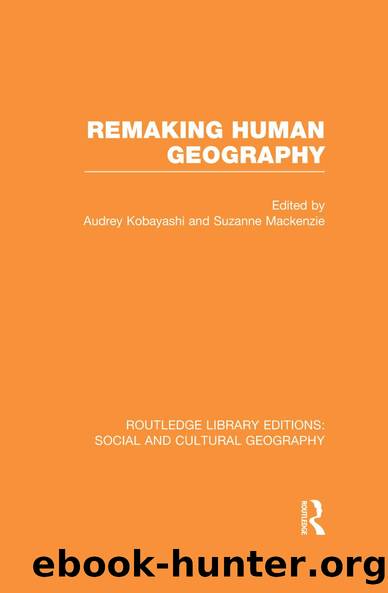Remaking Human Geography (RLE Social Cultural Geography) by Audrey Kobayashi Suzanne Mackenzie

Author:Audrey Kobayashi, Suzanne Mackenzie [Audrey Kobayashi, Suzanne Mackenzie]
Language: eng
Format: epub
ISBN: 9781138985063
Barnesnoble:
Publisher: Taylor & Francis
Published: 2016-02-28T00:00:00+00:00
NEOCLASSICAL ECONOMICS
Around the 1870s the key code was changed in economics. Labour values were out and utility was in. The metaphor was changed from the body, where aching muscles determined worth, to the mind, where mental desires and wants determined value. In the shuffle what was lost was a concern for social structure, and what took its place was an emphasis on the autonomous individual.
As with the case of labour values, utility is the starting point for the neoclassical vision of economy and society. The fact, as Joan Robinson (1962, p. 48) notes, that there are severe problems in defining the term misses the point about utilityâs role. Like labour values, the usefulness of utility is not in describing the world but in saying how it ought to be.
To be recognized as a legitimate theory of value, utility needs to be rooted in a stable exogenous constant in just the same way that labour values are. The anchor that secures utility is the human mind. As Dobb writes:
To be sufficient anchorage for a determinate theory of value, even formally viewed, it was necessary that utility should be conceived as an expression of some fairly permanent and consistent aspect of human psychologyâ¦In so far as utility could be hedonistically treated as a fundamental âsatisfactionâ, thenâ¦it could reasonably be held to fulfil this condition (Dobb 1940, pp. 156â7).
With utility tied to a firm bedrock, utility then becomes the key to explaining the economic system, and for that matter most other areas of social interchange as well. Specifically, because utility is thought to be a âgood thingâ, and in fact the only thing worth striving for, all human action is dependent on, and thus explainable in terms of, the adding and subtracting of utility. Furthermore, utility provides a purpose to peopleâs lives. The ultimate goal in life is to obtain as much utility as possible because it is only utility that makes humans tick. Thus, like the teleological element in Marxâs conception of society â the ultimate goal is a communist society, in which labour values are finally realized as being the true measure of worth (Dumont 1977) â there is also a teleological strain to neoclassical economicsâ conception of the individual; the purpose of an individualâs life is to maximize utility (see Mirowski 1984).
The consequence of making utility central is to redraw dramatically the boundaries of the economic problem, and societyâs relationship to it, as it was conceived by Marx. To examine this issue further I will first discuss the nature of the neoclassical economy, and then look at the type of society associated with it.
If for Marx production and distribution are the two main elements of the economy, then for neoclassical economics it is clearly consumption and exchange that are critical. As already suggested, actors in the neoclassical world are impelled to maximize utility. The origin of utility is, for the most part, the consumption of goods and services. Whereas labouring is bad â a source of disutility â consumption is good; it provides happiness and satisfaction to all who engage in it.
Download
This site does not store any files on its server. We only index and link to content provided by other sites. Please contact the content providers to delete copyright contents if any and email us, we'll remove relevant links or contents immediately.
Chaco's Northern Prodigies : Salmon, Aztec, and the Ascendancy of the Middle San Juan Region after AD 1100 by Paul F. Reed(376)
Digital International Relations by Unknown(371)
Law Enforcement Interpersonal Communication and Conflict Management by Brian Douglas Fitch(365)
Skilled interpersonal communication: Research, theory and practice, Fifth edition by Owen Hargie(355)
The Enduring Color Line in U.S. Athletics by Krystal Beamon Chris M. Messer(351)
Critical Perspectives on Human Security : Rethinking Emancipation and Power in International Relations by David Chandler; Nik Hynek(340)
EPSO CAST Political affairs EU policies: How to succeed in the selection procedure by Franco Reverte José María(325)
Evidence-Based Policy Making in Labor Economics by Hamermesh Daniel S.;Nottmeyer Olga K.;Nottmeyer Olga;King Sarah;King Sarah;King Sarah;(317)
Writing Public Policy - A Practical Guide to Communicating in the Policy Making Process by Catherine F. Smith(297)
Criminological Theory in Context by John Martyn Chamberlain(292)
Rothschild and Early Jewish Colonization in Palestine (Geographical Perspectives on the Human Past) by Ran Aaronsohn(290)
Positive Psychology and Spirituality in Counselling and Psychotherapy (Conflict, Ethics, and Spirituality, 12) by unknow(285)
Tibeton Yoga Its Secret Doc by Evans-Wentz(283)
Threshold Concepts in Women's and Gender Studies by Christie Launius Holly Hassel(278)
Social Problems, Social Issues, Social Science by James Wright(274)
Play in child development and psychotherapy: toward empirically supported practice by Sandra W. Russ(272)
Cognitive Development in Infancy and Childhood (Elements in Child Development) by Mary Gauvain(272)
Latin American Politics and Society by Gerardo L. Munck & Juan Pablo Luna(251)
What Makes a Social Crisis?: The Societalization of Social Problems by Jeffrey C. Alexander(232)
